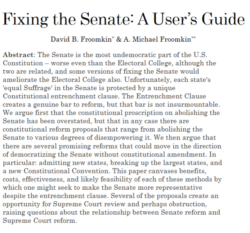 Published on dead trees at last! David B. Froomkin & A. Michael Froomkin, Saving Democracy from the Senate, 2024 Utah Law Review 397 (2024).
Published on dead trees at last! David B. Froomkin & A. Michael Froomkin, Saving Democracy from the Senate, 2024 Utah Law Review 397 (2024).
Here’s the abstract:
It should not be surprising that Americans say they are frustrated with their national institutions. Congress, particularly the Senate, responds poorly to the public’s needs and wants because it is increasingly unrepresentative of the electorate. Reform is difficult, however, because each state’s “equal Suffrage” in the Senate is protected by a unique constitutional entrenchment clause. The Entrenchment Clause creates a genuine bar to reform, but that bar is not insurmountable. We first argue that the constitutional proscription on reforming the Senate has been overstated, identifying a range of constitutional reform options that would be permissible despite the Entrenchment Clause. Several of these approaches circumvent the restriction imposed by the Entrenchment Clause by reforming the Senate in ways that do not alter the equal representation of states: disempowering the Senate, abolishing the Senate entirely, or adding at-large nationally elected senators. A different approach involves repealing the Entrenchment Clause and then either passing a second amendment reapportioning the Senate or asking courts to democratize it under the Equal Protection Clause. We then canvass reforms that could move in the direction of democratizing the Senate without constitutional amendment, including admitting new states, breaking up the largest states, and (although we do not advocate it) a new Constitutional Convention. Throughout, we discuss the relative merits and difficulties of each of these options. Reformers and scholars need a clear understanding of the relevant legal frameworks to develop effective strategies. While we recognize that none of these options are easy, we conclude that action to fix the Senate’s democratic deficit is essential— and urgent.

 President Franklin D. Roosevelt described December 7, 1941 as “a date which will live in infamy” in his speech the day after the Japanese attack on Pearl Harbor. 12/7 was a date seared into the memory of those who lived through it, although I think not nearly as meaningful to those who like me were born considerably later. Even infamy may have a half-life, and I suspect that today most people look at ‘Pearl Harbor Day’ on the calendar and don’t think that much of it.
President Franklin D. Roosevelt described December 7, 1941 as “a date which will live in infamy” in his speech the day after the Japanese attack on Pearl Harbor. 12/7 was a date seared into the memory of those who lived through it, although I think not nearly as meaningful to those who like me were born considerably later. Even infamy may have a half-life, and I suspect that today most people look at ‘Pearl Harbor Day’ on the calendar and don’t think that much of it.

